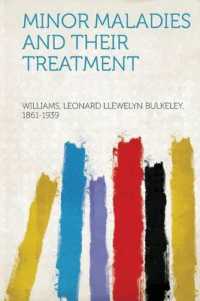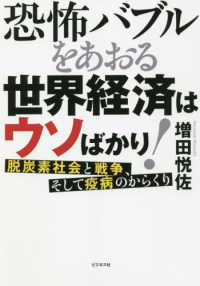- ホーム
- > 洋書
- > 英文書
- > Religion / Ethics
Full Description
The book offers a definitive study of the development of Kant's conception of the highest good, from his earliest work, to his dying days. Insole argues that Kant believes in God, but that Kant is not a Christian, and that this opens up an important and neglected dimension of Western Philosophy.
Kant is not a Christian, because he cannot accept Christianity's traditional claims about the relationship between divine action, grace, human freedom and happiness. Christian theologians who continue to affirm these traditional claims (and many do), therefore have grounds to be suspicious of Kant as an interpreter of Christian doctrine.
As well as setting out a theological critique of Kant, Insole offers a new defence of the power, beauty, and internal coherence of Kant's non-Christian philosophical religiosity, 'within the limits of reason alone', which reason itself has some divine features. This neglected strand of philosophical religiosity deserves to be engaged with by both philosophers, and theologians. The Kant revealed in this book reminds us of a perennial task of philosophy, going back to Plato, where philosophy is construed as a way of life, oriented towards happiness, achieved through a properly expansive conception of reason and happiness. When we understand this philosophical religiosity, many standard 'problems' in the interpretation of Kant can be seen in a new light, and resolved. Kant witnesses to a strand of philosophy that leans into the category of the divine, at the edges of what we can say about reason, freedom, autonomy, and happiness.
Contents
Introduction
1: Divine Ideas
2: Contemplating Creation
3: From Freedom to Freedom
4: Searching for the Unconditioned
5: God and the Good
6: The Proper Self
7: Objections: Coherence or Plausibility
8: Contradicting Morality: The Four Examples
9: Egress and Regress: The Categorical Imperative
10: The Identity of Freedom and Morality
11: The Moral World
12: Kant's Consistency: Motivations, Conditions, Constituent Parts, and Consequences
13: Freedom as Guarantor of the Possibility of the Highest Good
14: Does Kant Need Grace?
15: Does Kant Permit Grace?
16: God as an All-knowing Distributor of Happiness
17: The Glorious Community
18: The Two Highest Goods: God and the Kingdom of Ends







